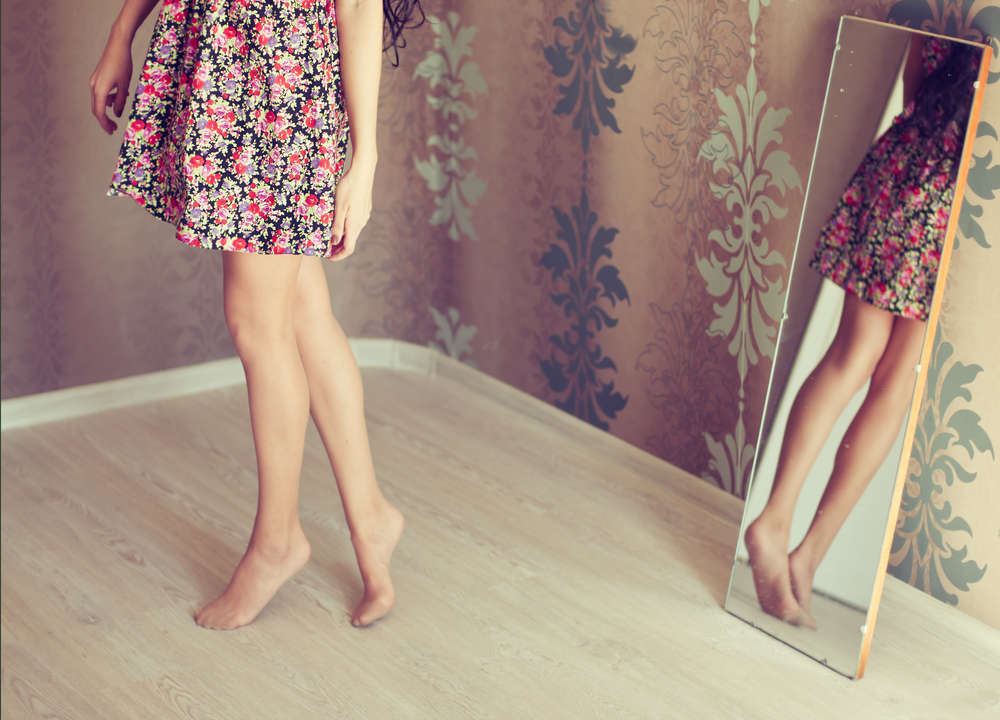Many Americans will notice that their jeans seem a bit tighter the day after Thanksgiving. Or when we step on the scale January 1st to jumpstart our New Year’s resolutions, the number may have gone up from the last time we weighed ourselves. Noticing changes in how clothes fit and checking weight are common behaviors, but sometimes checking behaviors, including checking our bodies, become frequent and may even interfere with everyday life.
Body checking occurs when someone compulsively monitors his or her body, weight, or shape. Scrutinizing their face in the mirror, measuring body parts, and feeling for fatness, muscle, or bone are all examples of body checking. Like many other checking behaviors, body checking occurs on a continuum. Some body checking behaviors (like regular weighing) are normal. But at the extreme end of the continuum, individuals may check for the smallest perceptible changes to their body. Does their ring fit the same way it did yesterday?
Frequent checking or checking in extreme, idiosyncratic ways is problematic for several reasons. Research shows that people who body check have poorer body image; they are more likely to feel dissatisfied with their body or weight and may diet to control their appearance. Body checkers report more eating disorder symptoms; they may skip meals, vomit, or exercise excessively to burn calories.
Why People Check: Coping With Anxiety And Controlling A Feared Situation
Why do some people body check whereas others do not? One theory is that people who body check do so to manage anxiety. In other words, checking can be a result of—a coping mechanism for —anxiety about one’s appearance. Many also believe that failure to body check will lead to what they consider to be negative consequences, like weight gain. While there is research to prove it, it’s no surprise to most people that there are biases and stigmas surrounding the idea of being “overweight”. Such weight stigma may contribute to anxiety about gaining weight and reinforce the importance of body checking in some people’s minds. In many cases, checking is seen as a preventative measure.
For example, if a woman thinks her thighs are too big she may use body checking to make sure that her thighs aren’t getting bigger. She may measure to see whether her thighs stay the same size each day, look to see whether her thighs touch when she’s standing, or whether they spread out when she sits.
Body checking can either prove or disprove the beliefs that underlie her appearance-related anxiety. Information gleaned from body checking can support her worries (“I was right, my thighs are bigger today”) or disprove her anxiety (“My thighs are the same size as yesterday”). Whether body checking supports or does not support her fears, it reinforces the behavior. Body checking strengthens beliefs like, “If I don’t body check, I won’t be able to tell that I gained or stayed at the same weight, so I must continue body checking.” The result may be a vicious cycle of appearance-anxiety and body checking strengthening and reinforcing each other.
Anxious College Women Are More At-Risk For Body Checking
Theoretically, anxiety and body checking are connected, but few studies have tested this. Furthermore, most existing studies of body checking have only examined these behaviors in women with eating disorders rather than the general population. Based on my experience conducting therapy, I observed body checking in women without eating disorders and believed that it was more common than existing studies suggested. I also noticed that strong underlying appearance anxiety appeared to contribute to body checking in several cases. To tests these ideas, I designed a study examining the connection between appearance anxiety (called social physique anxiety) and body checking. I studied these relationships in college women for several reasons: First, college is considered an at-risk time period for eating disorder symptom development. Second, in our society, women are often evaluated based on their appearance and thus women may be especially vulnerable to anxiety about their appearance. Consistent with my clinical observations, I found that college women who had higher anxiety about their physique reported more body checking. Although this study did not analyze why body checking was higher in appearance-anxious women, one theory is that they used body checking to reduce anxiety, as described above.
The Price of Obsessing Over Our Bodies
A second important finding from this study is that frequent body checkers experienced negative consequences. These women reported more clinical impairment (or personal, social, or thinking problems) because of their body checking. Specifically, they were more likely to endorse difficulty concentrating; problems at work or school; avoiding meals or social situations; and feeling upset, worried, or guilty. Clearly, this shows how harmful body checking can be for some women. It affects so much more than just body image.
While at this point it is still unclear what causes body checking, treatments that reduce body checking may help reduce anxiety in the long run. One such treatment is mirror exposure. During mirror exposure, a person looks at their body neutrally, without checking. This treatment reduces body checking, improves body image, and may help reduce anxiety.
In sum, appearance-related anxiety may lead to body checking, which may, in turn, have negative consequences. Although people may body check to reduce anxiety, it is possible that body checking increases anxiety as well. As beliefs about the importance of checking become stronger, the result is often increased feelings of urgency to check.
Emily K. White, a clinical psychology graduate from UNLV, is a fifth-year doctoral candidate actively involved in research on eating disorders and anxiety. She has authored articles in peer-reviewed journals, focusing on body checking, anxiety, and perfectionism. Emily's work earned her first prize from the Nevada State Psychological Association for studying the link between body checking, anxiety, and impairment in college women.



